
Top ESG Funds in Asia Boost Returns In Once Unloved Market
Asia’s top ESG funds are reaping the rewards of investing in Japan, a market largely ignored even by
1970-01-01 08:00

Philippines Moves Closer to Wealth Fund Plan With Senate Nod
The Philippines moved a step closer to establishing a sovereign wealth fund after the Senate approved the bill,
1970-01-01 08:00
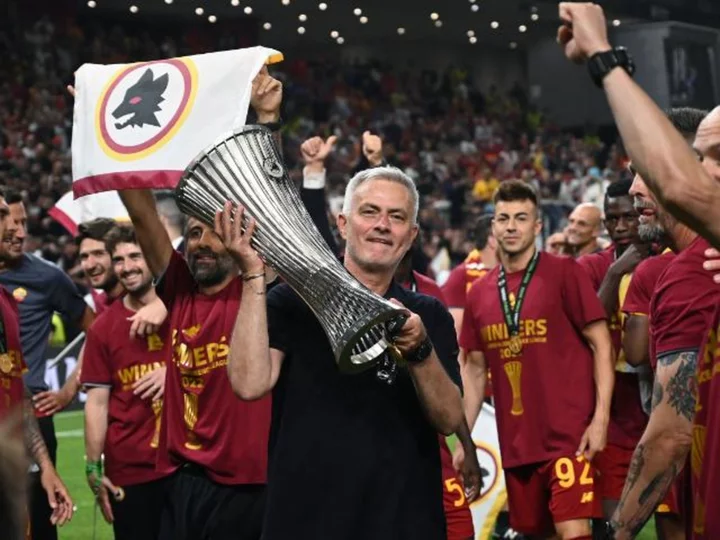
Europa League final: Jose Mourinho goes in search of sixth European trophy 20 years after his first triumph
What happens when an immovable object meets an unstoppable force?
1970-01-01 08:00

Menopause and menstruation guidance launched for workplaces to support employees
A new workplace standard has been launched for businesses to support employees experiencing menopause or menstruation. The British Standards Institute (BSI) has published the new guidance to help organisations retain experienced and talented staff after a consultation with experts and the public. The Menstruation, menstrual health and menopause in the workplace standard (BS 30416) sets out practical recommendations for workplace adjustments as well as strategies that can help employers meet the needs of those experiencing menopause or menstruation. It comes after research from the Fawcett Society suggested about 10% of those experiencing menopause have left the workplace due to symptoms such as hot flushes, dizziness, insomnia, and muscle and joint stiffness. Organisations which prioritise their people by building an inclusive workplace will be best placed to continue to thrive in the future Anne Hayes, British Standards Institute This figure rises to 25% for those with more severe symptoms. Wm Morrison and BT as well as representatives from Unison, the Federation of Small Businesses, the LGBT Foundation, the Institution of Occupational Safety and Health, the Daisy Network and Endometriosis UK all gave input to the development of BS 30416. The recommendations include workplaces considering whether there is a general awareness of menstruation and menopause in its culture and whether employees have opportunities for open conversations or to request support. Suitable training for line managers and HR managers, reviewing the workplace environment to include facilities such as quiet recovery spaces or discrete changing rooms, and options for flexible working are also among the guidance. Anne Hayes, director of sectors at the BSI, said: “Organisations which prioritise their people by building an inclusive workplace will be best placed to continue to thrive in the future. “There is no one-size-fits-all experience of menopause, but the data suggests thousands of women are leaving the workforce at this stage, contributing to significant productivity losses, robbing organisations of talented people, and removing mentors who can draw on their experience to support newer members of staff. It doesn’t have to be that way.” If we get this right for 50% of the population that we need in the workplace from an economic and experience perspective, it has the potential to make the final 10, 15 or 20 years of a woman’s career the most productive, exciting and meaningful Helen Tomlinson, menopause employment champion Helen Tomlinson, menopause employment champion for the UK Government, said: “I am truly delighted that the BSI have produced the Menstruation, menstrual health and menopause in the workplace standard, recognising the challenges, symptoms and experiences of both menopause and menstrual health and how these can affect women in the workplace. “It’s a free resource for any organisation, large or small across all sectors, to be able to utilise. This will go a long way to ensure that everyone can receive the support they need at this critical time. “I firmly believe this transition isn’t a time to step back, step down or step out. If we get this right for 50% of the population that we need in the workplace from an economic and experience perspective, it has the potential to make the final 10, 15 or 20 years of a woman’s career the most productive, exciting and meaningful.” Read More Charity boss speaks out over ‘traumatic’ encounter with royal aide Ukraine war’s heaviest fight rages in east - follow live Kate Silverton on swapping her BBC news career to work as a child therapist Watching Love Island this year? How to avoid comparing your body to what’s on screen Dating ‘green flags’ to look out for on Love Island – and in your own life
1970-01-01 08:00
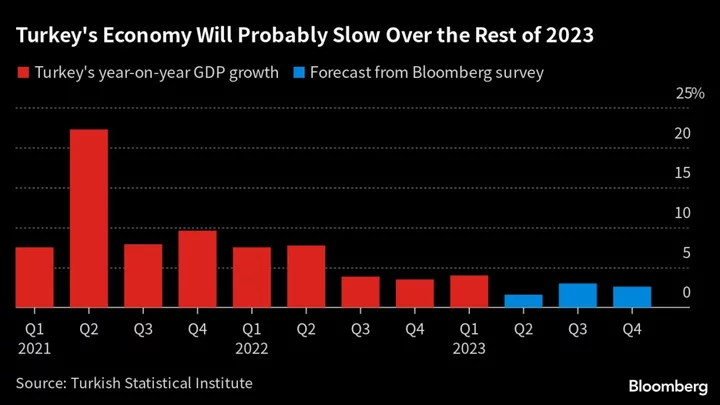
Turkish Economic Growth Accelerates, With Risk of Slowdown Ahead
Turkey’s economy expanded faster than expected at the start of the year, bolstered by pre-election spending and strong
1970-01-01 08:00

MFT Energy’s Profit Soars More Than 800% on Volatile Markets
Danish trader MFT Energy P/s boosted its profit for last year more than eightfold as price volatility soared
1970-01-01 08:00

Mexico Coke Bottler Femsa Sells €3.3 Billion Heineken Stake
Mexican Coca-Cola bottler Femsa sold about €3.3 billion of its shares in the Heineken Group, divesting its stake
1970-01-01 08:00

Chhattisgarh: India official fined $640 for draining dam to find phone
The man ordered millions of litres to be drained after dropping his phone while taking a selfie.
1970-01-01 08:00
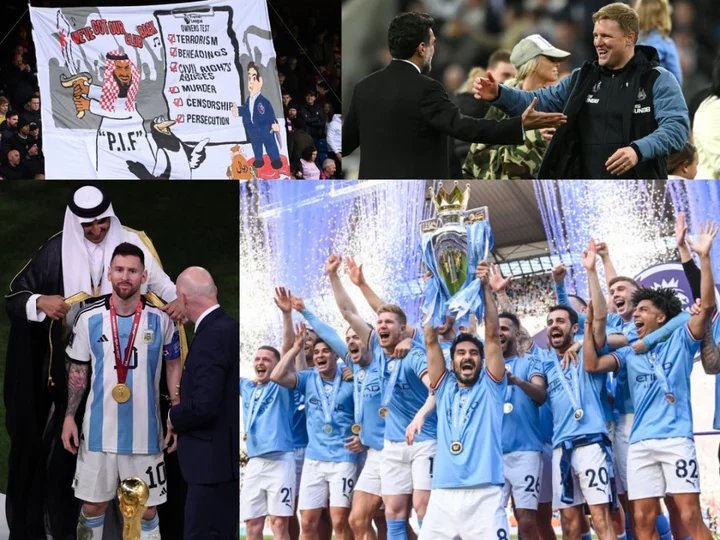
The year that sportswashing won: A season that changed football forever
For an illustration of the sort of double-think that has pervaded football this campaign, consider the actions of one prominent figure. They have effusively praised Manchester City in public, but constantly asked when the Premier League investigation is going to be concluded in private. This could actually refer to a few people, and might well be necessary realpolitik. It’s also the reality of the game in the 2022-23 season, one that has gone on so long that two contrasting perspectives on the same subject could both be entirely fair at different times. This was a campaign that was deeply predictable at one end and wondrously open below that. City may make history by winning a treble but also made history in becoming the first champions to have been charged with breaches that could yet see them expelled from the Premier League. Manchester United were often a shambles in some record defeats but also sensibly getting things together under the astute Erik ten Hag. On it goes, just like the season itself. There’s still almost a month left. Much of this comes from an event that remains more influential than even that seismic day in February when the Premier League quietly announced that City had been charged. That was of course a Qatar World Cup that is still having a considerable effect on the campaign. Summing this up is that it’s hard to get your head around the idea that a tournament actually happened this season. No, seriously. Qatar was more recent than Thomas Tuchel and Antonio Conte clashing over a handshake. It might even be more recent than Darwin Nunez being charitably described as “an agent of chaos” but, like one of his touches, that's lost in the mire. Yet it is all of a line, as are some of the other facts of the campaign. It is symbolic that the season of the Qatar World Cup also saw Abu Dhabi’s City come to the brink of a treble and Saudi Arabia’s Newcastle United get to the Champions League. There is actually a direct cause-and-effect here, since every major football decision these states have taken has seen their Gulf blockade rivals respond. The move to host the 2022 World Cup is still seen as setting off much of this. One senior figure privately quipped that this is “the year that sportswashing won”. It is certainly one where a number of different strands defining the modern game came together. There may yet be more. If the Sheikh Jassim bid does win the Manchester United sale, to conclude another of the season’s major themes, it would mean three of England’s Champions League clubs for next season are respectively owned by Abu Dhabi, Saudi Arabia and Qatar. And yet there is another contrast there, even if you have to go a little deeper. For all that the top end of the sport has become the preserve of Western billionaires and – increasingly – autocratic states, there has been a joyous unpredictability below that. The Europa League and Europa Conference League have been alive with opportunity and more captivating than ever, just as the Champions League top end – and its group of potential winners – has become so small. There is an enriching vitality in the two lesser competitions that are no longer seen at the elite level. One has the same teams and stories. The other two have revitalising runs at rare glory. The wildness of the Premier League’s bottom two-thirds meanwhile showed what the entire division could and should be like. The EFL play-offs were captivating, and featured two uplifting stories in Sheffield Wednesday’s historic comeback against Peterborough United and Luton Town’s rise. Rob Edwards’s side will join Brighton and Brentford in the Premier League now, both of whom have continued to defy the wider realities of the game. Leicester City’s relegation at the same time showed how difficult and fleeting that can be, how it can evaporate. Any success from outside the elite is therefore to be relished, in the manner that Napoli did in Serie A and Feyenoord in Eredivisie. Such feats stand as uplifting sporting stories in contrast to what the Qatar World Cup represented. Some were ironically influenced by that tournament, since an unprecedented disruption to the regular club season inevitably had a profound effect. It played havoc with physical conditioning programmes. All had to adapt, some did better than others. It was undeniably a factor in Liverpool, Tottenham Hotspur and Chelsea having such poor seasons, if obviously not the main reason. The issue is more that, if things go as normal, the wealthiest tend to succeed. This season was anything but normal as it continues to stretch on for so long. None of that is to excuse many flaws of course, not least in Chelsea’s excessive spending. There is a moral lesson there that money can only bring so much, at least in the short term. There was also classic pantomime underneath the most serious discussions. Todd Boehly made himself one of the game’s modern characters, reminiscent of some of the larger-than-life figures of the 1970s. Frank Lampard’s return was an almost comical cameo, that only left bemusement. Conte put on a theatrical performance before ultimately leaving Spurs. Pep Guardiola had a display of his own in dismissing his players as “happy flowers”. The coaches demand focus in another way. There's a fair argument that every Premier League manager who wasn’t sacked has a claim to be the best of the season. All of Roberto De Zerbi, Gary O’Neill, Thomas Frank, Mikel Arteta, Guardiola and Eddie Howe overperformed to varying degrees. David Moyes has got West Ham United to a European final, and the brink of a first trophy in 44 years. The only exception to this is arguably Jurgen Klopp, but his excellence is beyond question. The uncertainty is just about whether he can rebuild Liverpool to the same degree. There was much more causing their Champions League failure than the mid-season disruption. The effects of that break only went so far, too. The most lavish football project was naturally best equipped to adapt. Guardiola primed his City team to come good in the same way he did during that Covid season. The Catalan is clearly a genius but fitting a goalscorer like Erling Haaland to a team like City is one of the less challenging problems. A young Arsenal actually did remarkably to set the pace for so long. If you stand back, it was really an inevitability they were going to be overtaken, regardless of how it ended up happening. Qatar disrupted things but only to a certain degree. City, Bayern Munich, Paris Saint-Germain and a hugely criticised Barcelona still won domestic titles. It all points to how the game is actually at a strange point in its historic evolution, split in a few ways. The most questionable interests are seeking to purchase this glorious unpredictability and pantomime, a dynamic at once eroding such theatricality but also ensuring the defiant displays are all the more joyous. There will come a point, however, where the game reaches a line it can’t go past. We’re not there yet but there are signposts. In 2021-22, Vladimir Putin’s invasion of Ukraine forced football to confront realities it wouldn’t otherwise have faced, and take decisions it would otherwise have ignored. It was arguably the season the mask slipped. The 2022-23 campaign was one where football had two faces. Read More Premier League 2022/23 season awards: Best player, manager, transfer flop and breakthrough act Man City’s quest for legitimacy is a battle they may never win Easy in the end for Manchester City – same again next season? Football rumours: Tottenham and Newcastle after James Maddison and Harvey Barnes Pep Guardiola takes top honours at LMA Awards Manchester United’s Anthony Martial ruled out of FA Cup final through injury
1970-01-01 08:00
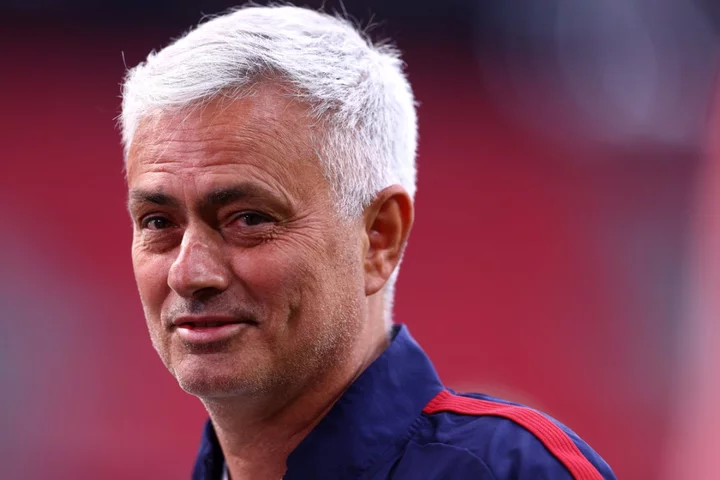
Jose Mourinho flashing the old charm with chance to return to the big time
They usually come out of nowhere, but reduce everyone to sniggering laughter – even if some of it can be a bit guilty. Jose Mourinho still stays in contact with other managers as well as former colleagues and there are often moments where he feels the need to comment on someone else in the game, and sends out a message featuring the most cutting descriptions. Some of it can be unprintable. All of it is really sent to amuse the recipient. It shows the old mischief is there. It shows the old charm is there. It’s also working on people anew. As Mourinho prepares for his sixth European final, and a return to the fixture that launched his career, there has been a general goodwill across the game for the old master to win again. Part of it is that the halo has fallen from some of the rivals that were supposed to have consigned his ways to the past. As Jurgen Klopp gets into arguments with journalists and Pep Guardiola publicly criticises players as well as his own supporters, there’s a growing argument that “everyone just becomes Jose in the end”. All great managers have that bright early rise where they can do no wrong, that peak when their legend is preserved but also their ways are set, followed by an inevitable pride that sees them get highly prickly about any criticism or drop-off. Part of it, however, is that Mourinho himself has moved into a new career stage. He’s no longer a threat, at least to the elite. In England, he’s largely out of sight, which makes his sudden returns to attention remind us of the legend that used to be there. Everyone forgets the old battles. The twist, of course, is that there are many who feel that Mourinho is using this to launch himself back into the big time in a similar manner to Carlo Ancelotti. Paris Saint-Germain are circling. It’s also why it’s so fitting that so much around this Europa League final has brought Mourinho’s career full circle, while also bringing a tour around recent major moments. It was after all the Portuguese’s last match against Sevilla, notably in Europe’s premier competition of the Champions League, where he made that notorious appeal to “football heritage”. The phrase could well describe this fixture in Budapest, given that Mourinho has never lost a European final, and Sevilla have the greatest record in the Europa League. It was instead a typically lashed-out defence where he attempted to argue Manchester United should not be so critical of an elimination to such a club, since they’ve suffered so many defeats in Europe, one of them to his Porto. The comments had the added intention of reminding everyone of his great career, but they really showed how he had little choice but to point to the past. It wasn't happening in the present. That defeat didn’t get Mourinho sacked but it was seen as a key moment when he eventually departed Old Trafford later that year. There was a feeling within the game that also marked his exit from the very highest level of clubs, as showcased by the jobs he has taken since. Both Tottenham Hotspur and Roma have seen the Champions League as a great ambition rather than their natural home, while Serie A itself is no longer anything close to the main show that the Premier League is. It’s been that gradual decline, where a manager suddenly finds himself away from where it’s really at. Except, at Roma, there have been gradual steps back. Mourinho won the Europa Conference League last year, to deliver the club’s first continental trophy, and now has them on the brink of a second, superior trophy in Budapest. Some of the reasons for this, however, are also the reasons why Roma have again failed to finish in the top four and why he has fallen from that elite. While top clubs now expect an ideology that proactively imposes a pressing-possession game and adheres to process, Mourinho is still mostly focused on reacting to individual opposition. Sources with knowledge of his work with Roma say that “he is still a manager more afraid of losing than excited by winning”. That has been reflected in a well-drilled but constrained 3-5-2. The approach has seen Roma look stale in many league games, especially as there is little development in terms of attacking construction. It's why his team are so dependent on individual moments of inspiration, like from Paolo Dybala against Feyenoord. That’s been heard before. Some of the other effects, however, have also been seen before. The difference comes in the rarefied air of Europe. It is as if that unique atmosphere of a night under the lights brings the incredible concentration necessary for Mourinho’s gameplan. That is why Roma have been so difficult to break down in the Europa League, in contrast to Serie A. That’s what he did in virtually all of his most famous wins, from that famous Champions League semi-final against Barcelona with Internazionale, to last year’s Europa Conference against Feyenoord, and his last Europa League trophy with Manchester United against a young Ajax. This is how he has such a good record in finals, and a flawless record in European finals going back to that first Uefa Cup against Celtic 20 years ago. There were fair questions as regards Mourinho’s overall outlook for a club like United when he got the team to adapt to the movements of a teenage centre-half such as Davinson Sanchez in 2017, but the point was it represented an obvious route to victory on the day. There remain few better at picking out the gaps in an opposition side and forensically acting upon them. This may not be productive over a season. It can be inspired in any given game. This has struck some at Roma, especially since one belief was that Mourinho would gradually start to play a more expansive game if he was assured the time and space he didn’t have at previous clubs. It just hasn't really worked that way. There is an argument being made that a Europa League may represent a fitting ending, especially as coaches like Antonio Conte and Roberto De Zerbi are all interested in the job. If anyone at Roma was even considering a change, though, it would be rendered completely irrelevant by the supporters. They adore him. There would be uproar if he left. There will be adulation if he lifts the Europa League. Mourinho is currently finalising his plans for Sevilla, but a problem is the Spanish side have a force of their own in this competition. That especially manifested itself against Erik ten Hag's United. Mourinho will require something extra, some of that old motivation. That is what has really elevated his tactics in the past, the emotional intensity in every moment. That is something he can still draw out. It may yet see PSG bring him back to that elite strand of club. The charm is still there. Read More Jose Mourinho takes snide dig at Tottenham and Daniel Levy Ryan Mason ‘trusts the people making decisions’ at Tottenham ahead of key summer Jose Mourinho takes snide dig at Tottenham and Daniel Levy Jose Mourinho into another European final as Roma set up Sevilla showdown
1970-01-01 08:00
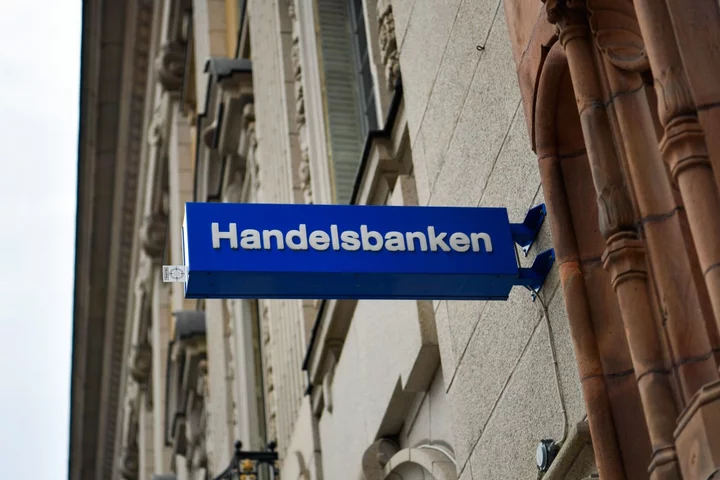
Handelsbanken to Sell Most of Finnish Unit for €1.3 billion
Swedish lender Svenska Handelsbanken AB has taken a major step toward exiting Finland after it struck agreements to
1970-01-01 08:00
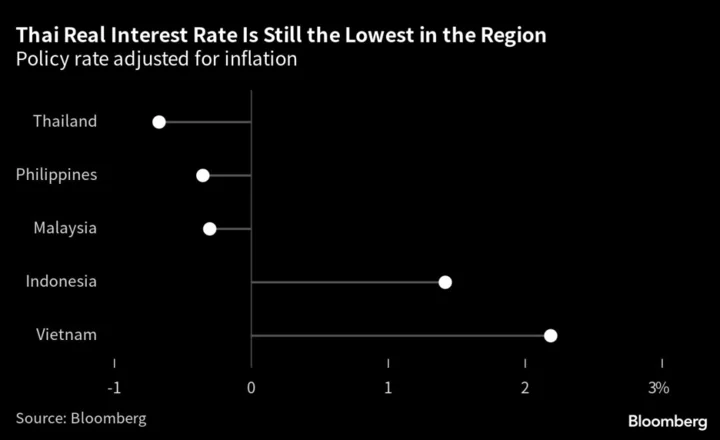
Thailand Raises Key Rate to 8-Year High to Win Inflation Fight
Thailand’s central bank raised its benchmark interest rate to the highest level in eight years to anchor inflation
1970-01-01 08:00
